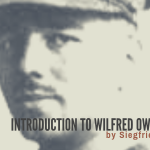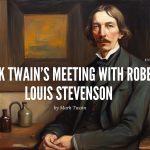On Siegfried Sassoon
by Robert Nichols

Sassoon the Man: In appearance he is tall, big-boned, loosely built. He is clean-shaven, pale or with a flush; has a heavy jaw, wide mouth with the upper lip slightly protruding and the curve of it very pronounced like that of a shrivelled leaf (as I have noticed is common in many poets). His nose is aquiline, the nostrils being wide and heavily arched. This characteristic and the fullness, depth and heat of his dark eyes give him the air of a sullen falcon. He speaks slowly, enunciating the words as if they pained him, in a voice that has something of the troubled thickness apparent in the voices of those who emerge from a deep grief. As he speaks, his large hands, roughened by trench toil and by riding, wander aimlessly until some emotion grips him when the knuckles harden and he clutches at his knees or at the edge of the table. And all the while he will be breathing hard like a man who has swum a distance. When he reads his poems he chants and one would think that he communed with himself save that, at the pauses, he shoots a powerful glance at the listener. Between the poems he is still but moves his lips… He likes best to speak of hunting (he will shout of it!), of open air mornings when the gorse alone flames brighter than the sky, of country quiet, of his mother, of poetry—usually Shelley, Masefield and Thomas Hardy—and last and chiefly—but always with a rapid, tumbling enunciation and a much-irked desperate air filled with pain—of soldiers. For the incubus of war is on him so that his days are shot with anguish and his nights with horror.
He is twenty-eight years old; was educated at Marlborough and Christchurch, Oxford; was a master of fox-hounds and is a captain in the Royal Welsh Fusiliers. Thrice he has fought in France and once in Palestine. Behind his name are set the letters M.C. since he has won the Military Cross for an act of valour which went near to securing him a higher honour.
Sassoon the Poet
The poetry of Siegfried Sassoon divides itself into two rough classes—the idyllic and the satiric. War has defiled one to produce the other. At heart Siegfried Sassoon is an idealist.
Before the war he had hardly published a line. He spent his summers in the company of books, at the piano, on expeditions, and in playing tennis. During winter he hunted. Hunting was a greater passion with him than poetry. Much of his poetry celebrated the loveliness of the field as seen by the huntsman in the early morning light. But few probably guessed that the youth known to excel in field sports excelled also in poetry. For, in its way, this early poetry does excel. It was characteristic of him that nearly every little book he then wrote was privately printed. Poetry was for him just something for private and particular enjoyment—like a ride alone before breakfast. Among these privately printed books are Twelve Sonnets (1911), Melodies, An Ode for Music, Hyacinth (all 1912). The names are significant. He was occupied with natural beauty and with music. In 1913 he publishes in a limited and obscure edition Apollo in Doelyrium, wherein it seems that he is beginning to find a certain want of body and basis in his poems made of beautiful words about beautiful objects. Later in the same year, with Masefield’s Everlasting Mercy (1911), Widow in the Bye Sheet (1912) and Daffodil Fields (1913) before him, he starts to write a parody of these uncouth intrusions of the sorrows of obscure persons into his paradise but half way through the poem adopts the Masefield manner in earnest
and finishes by unsuccessfully endeavouring to rival his master. In 1914 the War breaks out. Home on leave in 1915 he privately prints Discoveries, a little book which contains some of the loveliest of his ‘paradise’ poems. In 1916 the change has come. He can hardly believe it himself. ‘Morning Glory’ (privately printed) includes four war poems. He has not definitely turned to his later style but he hovers on the brink. The war is beginning to pain him. The poems ‘To Victory’ and ‘The Dragon and the Undying’ show him turning toward his paradise to see if its beauty can save him … The year 1917 witnesses the publication of The Old Huntsman.
This book secured instantaneous success. Siegfried Sassoon, on its publication, became one of the leading young poets of England. The book begins with the long monologue of a retired huntsman, a piece of remarkable characterisation. It continues with all the best of the ‘paradise’ poems, including the loveliest in ‘Discoveries’ and ‘Morning Glory.’ There are also the ‘bridge’ poems between his old manner and his new such as the ‘To Victory’ mentioned above. But interspersed among the paradise poems are the first poems in his final war style. He tells the story of the change in a characteristic manner—Conscripts . For like nearly every one of the young English poets, he is to some extent a humourist. His humour is not, however, even through ‘The Old Huntsman’ all of such a wise and gentle tenor. He breaks out into lively bitterness in such poems as ‘They,’ ‘The Tombstone Maker’ and ‘Blighters.’
- 100 Screenwriting Ideas to Get You Writing - January 20, 2026
- 100 Winter Storm Writing Prompts - January 17, 2026
- 100 Haunted House Story Starters: Craft Your Scariest Tale Yet - January 10, 2026



